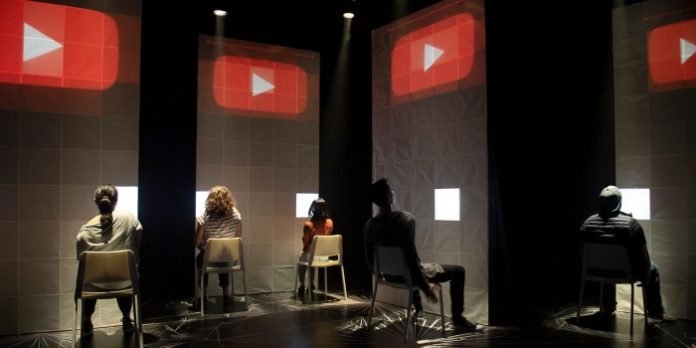With Incognito Mode: A Play About Porn, Langara College’s Studio 58 and Vancouver’s Neworld Theatre have developed a new work that asks the question, “What does it mean to have grown up with the internet and readily available representations of sexuality?”
Beginning with a workshop performance showcased at Studio 58’s Risky Nights last spring, the piece has been expanded to further explore the personal, social, and ideological consequences of growing up as part of the first generation with unfettered and on-demand access to pornography.
In this Q&A, Incognito Mode director Chelsea Haberlin provides some insight into the challenges in working with a student cast and the show’s provocative material.
This interview has been edited.
How did this show come about? What compelled you to see this story told?
The idea for this show came from Marcus Youssef [Neworld Theatre]. At the time he had two teenage sons and was thinking about how their relationship to pornography was different than his had been growing up. He wanted the chance to ask what it means to have grown up with fast, easy access to online pornography with a group of youth who had experienced this themselves.
For me, I’m always drawn to topics that are considered taboo. And what could be more taboo than pornography?
I also find that projects that scare me are ultimately the most interesting to work on. I was scared of pornography. It made me nervous to think about it and talk about it. That means I didn’t know enough about it. But it’s everywhere so I knew that doing a deep dive into the topic would serve me, and ultimately an audience.
Also, I love process and I really enjoy working with emerging artists. It’s invigorating to be around their enthusiasm and courage.
The show comes with an audience advisory (for coarse language, explicit sexual content, and depiction of sexual violence). How did you navigate the show with students? Did they have an option of opting out of a particular scene?
We decided that we wanted Risky Nights to be the first phase of development for this show. This is a project that every fourth term class at Studio 58 does, where they create their own show. So the group was chosen for us.
Incognito Mode is a part of a multi-institution grant out of McGill University and was therefore observed by two local academics: Stuart Poyntz from SFU and Ruth Beer from Emily Carr. There was a great deal of ethics approval required from all three institutions in order for this to be possible.
In the first round of development, all material was generated by the students. It was fully their decision what they wanted to write and perform. They were always given the option to opt out of a scene or change the words or even opt out of the project altogether, with no negative repercussions, if they felt like that was what they needed to do. We talked a lot about consent and it was very clear that they could stop a scene or a conversation at any time.
In this second round of development, for the mainstage production at Studio 58, Marcus took on writing the piece. We had a long conversation with the students and got their permission to have Marcus mold their writing and ideas that came up in the first round into a narrative.
Every character is fictionalized so none of the students’ names are used in the piece. I had one-on-one conversations with every student at the end of the first week to ensure that they were comfortable with the way their words and stories were being used and to make sure they were cast in a role that they were okay with. As always, they could opt out of anything at any time with no negative consequences.
The subject matter is provocative. Is it presented as a documentary or did you create a narrative storyline?
There is a narrative storyline that Marcus created.
Where did you have the most fun in creating this piece?
It has been pretty incredible hearing the stories and experiences of the students involved. Often the stories were dark or hard to hear so maybe that’s not exactly fun, but certainly fascinating.
It was really fun to watch Marcus take the work from phase one and create characters and a narrative out of it. The development process is always so interesting. As the director, I’m finding it really fun to integrate the design. It’s an ambitious design with a great deal of technology, specifically video and lighting, so it’s tedious but really incredible when it all comes together.
The funniest thing for me is that I’m almost nine months pregnant and constantly saying things like, “Can anal and pussy licking be projected in quicker succession?” I think the juxtaposition of those two things is pretty hilarious.
What are you hoping audiences walk away with?
I hope that this piece encourages audiences to want to talk more openly about their own experiences with porn and sexuality. Most people watch porn yet it is almost never spoken about between family and friends. It’s incredibly taboo. I hope the honesty and bravery in this piece sparks conversations that people may have been too scared to have before.
Incognito Mode: A Play About Porn continues at Langara College’s Studio 58 until October 14. Visit studio58.ca for tickets and information.

